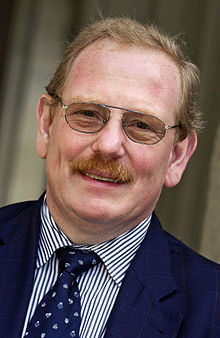
Back راينهارد جنزيل Arabic راينهارد جنزيل ARZ ৰেইনহাৰ্ড গেনজেল AS Reinhard Genzel AST راینهارد قنتزل AZB Райнхард Генцэль BE Райнхард Генцел Bulgarian রাইনহার্ড গেনৎসেল Bengali/Bangla Reinhard Genzel BS Reinhard Genzel Catalan
Reinhard Genzel | |
|---|---|
 Genzel in 2012 | |
| Born | 24 March 1952 Bad Homburg vor der Höhe, West Germany (now Germany) |
| Education | |
| Known for | Infrared astronomy Submillimetre astronomy |
| Awards |
|
| Scientific career | |
| Fields | Astrophysics |
| Institutions | Max Planck Institute for Extraterrestrial Physics University of California, Berkeley |
| Thesis | Beobachtung von H2O-Masern in Gebieten von OB-Sternentstehung (1978) |
| Doctoral advisor | Peter Georg Mezger |
Reinhard Genzel ForMemRS[1] (German pronunciation: [ˈʁaɪnhaʁt ˈɡɛntsl̩] ⓘ; born 24 March 1952) is a German astrophysicist, co-director of the Max Planck Institute for Extraterrestrial Physics, a professor at LMU and an emeritus professor at the University of California, Berkeley. He was awarded the 2020 Nobel Prize in Physics "for the discovery of a supermassive compact object at the centre of our galaxy", which he shared with Andrea Ghez and Roger Penrose.[2][3] In a 2021 interview given to Federal University of Pará in Brazil, Genzel recalls his journey as a physicist; the influence of his father, Ludwig Genzel; his experiences working with Charles H. Townes; and more.[4][5]
- ^ http://royalsociety.org/people/reinhard-genzel/ Professor Reinhard Genzel ForMemRS
- ^ "Press release: The Nobel Prize in Physics 2020". Nobel Foundation. Retrieved 6 October 2020.
- ^ Overbye, Dennis; Taylor, Derrick Bryson (6 October 2020). "Nobel Prize in Physics Awarded to 3 Scientists for Work on Black Holes – The prize was awarded half to Roger Penrose for showing how black holes could form and half to Reinhard Genzel and Andrea Ghez for discovering a supermassive object at the Milky Way's center". The New York Times. Retrieved 6 October 2020.
- ^ Interview with Professor Reinhard Genzel (2020 Physics Nobel Prize Laureate) - Pt. I, 20 July 2021, archived from the original on 12 December 2021, retrieved 11 August 2021
- ^ Interview with Prof. Reinhard Genzel (2020 Physics Nobel Prize Laureate) - Pt. II, 10 August 2021, archived from the original on 12 December 2021, retrieved 11 August 2021